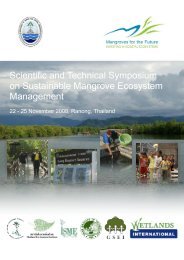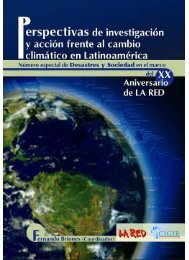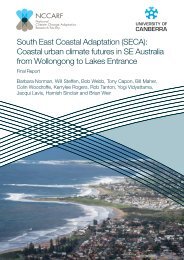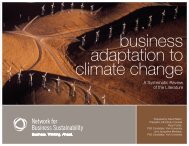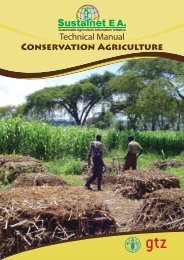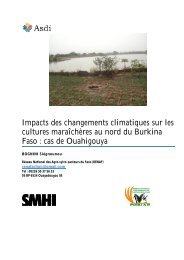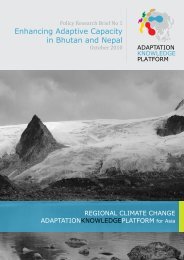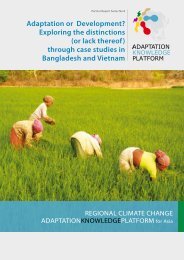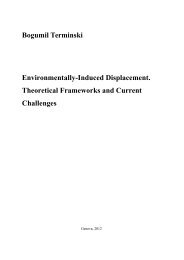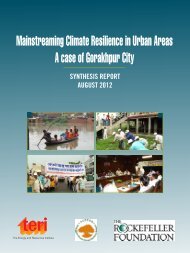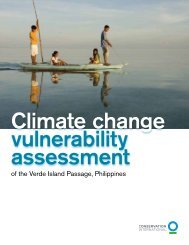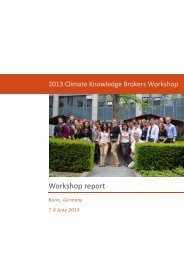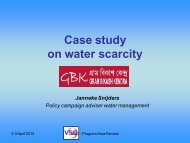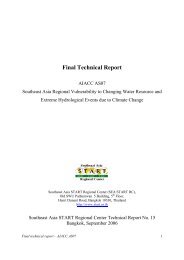social enterprise modelling a new form of more direct ex<strong>change</strong>s between farmers <strong>and</strong>consumers in Melbourne. CERES FairFood (<strong>and</strong> related initiatives such as FoodConnect in Brisbane <strong>and</strong> Sydney) sources fresh produce <strong>and</strong> processed items on fairterms from 32 farmers <strong>and</strong> suppliers, most located within a 150km radius of Melbourne.The project then markets the produce to <strong>urban</strong> consumers in Melbourne, <strong>and</strong> employsa team of packers <strong>and</strong> drivers to make up vegetable <strong>and</strong> fruit boxes <strong>and</strong> deliver them toits customers. The enterprise has been in operation for just over two years, <strong>and</strong>currently delivers around 600 boxes of fresh produce per week, supplemented withvarious processed ‘extras’ such as bread, grains, cheeses, soy products, honey, tea,<strong>and</strong> coffee.The Green ShedThe Green Shed emerged from the commercialization needs of local <strong>food</strong> producers onTamborine Mountain, in the Gold Coast City hinterl<strong>and</strong>. The Green Shed provides anopportunity for small <strong>and</strong> medium sized farms to sell their produce on a weekly <strong>and</strong> cooperativebasis. Farmers harvest <strong>and</strong> deliver produce to the Green Shed, <strong>and</strong> at theend of the day they collect their money <strong>and</strong> any remaining goods.Bunyip Food BeltThe Bunyip Food Belt was conceived during the years of drought as a large-scaleinfrastructure project, designed to extend the existing irrigation piping that deliveredrecycled water from the Eastern Water Treatment Plant into Cardinia, Cranbourne <strong>and</strong>Koo-wee-Rup. The project is a consortium of three councils – the cities of Casey,Cardinia <strong>and</strong> Mornington Peninsula, together with three water companies – South-eastWater, Melbourne Rural Water, <strong>and</strong> Southern Water. It was intended to ‘drought-proof’the highly-productive market garden areas on the south-east fringes of the city. Afeasibility study carried out for the consortium in 2010 revealed that the additional l<strong>and</strong>brought into irrigated production as a result of the new water infrastructure wouldgenerate over $200 million of added value to the regional economy, <strong>and</strong> an additional2,400 jobs by 2030. Subsequently, a Bunyip Food Belt br<strong>and</strong> has been created <strong>and</strong> onthe basis of that br<strong>and</strong> <strong>and</strong> the assumption of increased agricultural production, Casey-Cardinia Council is seeking to attract investment to the region, with a focus on <strong>food</strong>processing <strong>and</strong> manufacturingCasey Food HubFood Hubs, conceived as ‘centrally located facilities with business managementstructure, facilitating the aggregation, storage, processing, distribution, <strong>and</strong> marketingof locally/regionally produced <strong>food</strong> products’ (USDA 2011), emerged in the UnitedStates over the past decade as the ‘missing piece’ of infrastructure in emerging local<strong>food</strong> economies. Figure 2 below shows the multi-functionality of Food Hubs, in terms oftheir diverse economic, social <strong>and</strong> educational activities. While their operations <strong>and</strong>governance structures vary considerably, nearly all Food Hubs appear to share two keycore objectives: improving the livelihoods of local farmers <strong>and</strong> growers; <strong>and</strong> increasingaccess to healthy fresh <strong>food</strong> for all residents.In 2011, the City of Casey <strong>and</strong> VicHealth commissioned a team of consultants to scopethe potential for a Food Hub to be established in the Casey-Cardinia area. Based on<strong>Urban</strong> <strong>food</strong> <strong>security</strong>, <strong>urban</strong> <strong>resilience</strong> <strong>and</strong> <strong>climate</strong> <strong>change</strong> 125
stakeholder consultations, the report suggested that a local Food Hub should havethree core objectives:Policy initiativesbetter marketing outlet <strong>and</strong> fair prices for producers;healthy eating for residents – more fruit <strong>and</strong> vegetables;skill development, community connection <strong>and</strong> job creation through new localenterprises.The VicHealth Food for All project had the objective of raising the prominence <strong>and</strong>priority of <strong>food</strong> <strong>and</strong> <strong>food</strong> <strong>security</strong> in council policy documents <strong>and</strong> significant policy<strong>change</strong> is now taking place within a number of Melbourne councils.One outcome from the Food for All project is that a number of local governments havetaken policy initiatives to support the development of <strong>urban</strong> agriculture, <strong>and</strong> integrate<strong>food</strong> <strong>security</strong> issues into their planning frameworks. The city of Yarra passed its <strong>Urban</strong>Agriculture guidelines in June 2011.These are tools which say there’s a process that you follow, here’s an officer inCouncil that you can contact, to help you navigate the process… Places likeMaribyrnong, they have a ‘Growing Food, Growing Maribyrnong’ projectcoordinator who is redeveloping all their community gardens. They’re trying toreclaim all that contaminated l<strong>and</strong>, those brownfields, <strong>and</strong> develop it intocommunity gardens, targeting the desertification issue…the City of Melbournehas put out <strong>urban</strong> agriculture guidelines for street gardens…they’ll probablycreate a position to look after it. That’s a big cultural watershed, when the City ofMelbourne is doing that [Local government employee, Melbourne].The next step is to link these various initiatives together in order to facilitate sharing ofbest practice <strong>and</strong> mutual learning. While this is already beginning to happen with somelocal councils, there is a significant opportunity for a Melbourne-wide initiative to form atlocal government level.5 The impact of <strong>climate</strong> <strong>change</strong> on <strong>food</strong> <strong>security</strong> <strong>and</strong> <strong>urban</strong> agricultureThe effects of <strong>climate</strong> <strong>change</strong> are likely to exacerbate a range of existing problems with<strong>food</strong> supply, including the problems of <strong>food</strong> <strong>security</strong> <strong>and</strong> <strong>food</strong> colonisation. Morgan &Sonnino (2010) use the phrase ‘the new <strong>food</strong> equation’ to describe the constellation ofcomplex new developments that have obliged politicians <strong>and</strong> planners to treat <strong>food</strong>policy more seriously. This constellation includes the <strong>food</strong> price surge of 2007/08 whichled to a sharp rise in global <strong>food</strong> in<strong>security</strong>. This contributed to the current position of<strong>food</strong> <strong>security</strong> as a matter of national <strong>security</strong> in the UK <strong>and</strong> may be leading to newforms of ‘<strong>food</strong> colonialism’ (Morgan & Sonnino, 2009:210) whereby cash rich but <strong>food</strong>poor countries systematically buy up the productive capacity of poorer countries. Rapid<strong>urban</strong>isation in many countries is also raising concerns about the <strong>resilience</strong> of <strong>urban</strong><strong>food</strong> supply chains. While the effects of more variable rainfall patterns, more very hotdays, more severe storms <strong>and</strong> changing patterns of vector borne diseases are likely tohave profound effects on traditional agricultural practices, they will also affect <strong>urban</strong>agriculture.<strong>Urban</strong> <strong>food</strong> <strong>security</strong>, <strong>urban</strong> <strong>resilience</strong> <strong>and</strong> <strong>climate</strong> <strong>change</strong> 126
- Page 1 and 2:
Synthesis and Integrative ResearchF
- Page 3 and 4:
Published by the National Climate C
- Page 5 and 6:
ABSTRACTFood security is increasing
- Page 7 and 8:
1. a review of the literature: on n
- Page 9 and 10:
its Food for All project. This help
- Page 13 and 14:
In response to the existential thre
- Page 15 and 16:
2. OBJECTIVES OF THE RESEARCHFood i
- Page 17 and 18:
debates and to the more systematic
- Page 19 and 20:
organisation in the past few years.
- Page 21 and 22:
4. RESULTSIn this section we presen
- Page 23 and 24:
increasing productivity. Thus, whil
- Page 25 and 26:
people and the origins of their foo
- Page 27 and 28:
urban food supply chains. Thus, whi
- Page 29 and 30:
This logistics system is dominated
- Page 31 and 32:
Like Hodgson et al., as per definit
- Page 33 and 34:
esilient, powerful by being locally
- Page 35 and 36:
volume or even its contribution to
- Page 37:
community food growing can have on
- Page 40 and 41:
generations this history has been f
- Page 42 and 43:
a stronger focus on addressing the
- Page 44 and 45:
The third key aspect is fairness -
- Page 46 and 47:
climate (which we live and work in
- Page 48 and 49:
agriculture. Eight percent is in ur
- Page 50 and 51:
This concept of the ‘spaces in be
- Page 52 and 53:
esearch scientist and chair of the
- Page 54 and 55:
As discussed above, protection of t
- Page 56:
4.2.5 What is the extent and the im
- Page 60 and 61:
no place under the panoply of pract
- Page 62 and 63:
increased, the market dominance of
- Page 64 and 65:
… the residents of S Park called
- Page 66 and 67:
5. CONCLUSIONSThere is growing conc
- Page 68 and 69:
urban resilience. This inevitably c
- Page 70 and 71:
In many respects these contrasting
- Page 72 and 73:
Many interviewees of both standpoin
- Page 74 and 75:
a given area. The rationale for thi
- Page 76 and 77:
mapping the location of sources of
- Page 78 and 79:
Australian food policy debates refl
- Page 80 and 81:
APPENDIX 1: URBAN FOOD SECURITY, UR
- Page 82 and 83:
IntroductionGlobally, and in Austra
- Page 84 and 85: Review methodsThis stage of the res
- Page 86 and 87: despite many of the causes of food
- Page 88 and 89: …by 2050… food production will
- Page 90 and 91: 2. How is food security (in general
- Page 92 and 93: the food security of cities, but no
- Page 94 and 95: While some see the density of devel
- Page 96 and 97: when suppliers, distributors, and c
- Page 98 and 99: a more prominent role in enhancing
- Page 100 and 101: community gardens webpage on the Co
- Page 102 and 103: comprehensive description of the ca
- Page 104 and 105: In both the developed and developin
- Page 106 and 107: Their review notes a significant in
- Page 108 and 109: lines of supply from often rural pl
- Page 110 and 111: 1 IntroductionCities have always be
- Page 112 and 113: Despite some attempts to curb urban
- Page 114 and 115: the Gold Coast remains a city that
- Page 116 and 117: ackyard/community gardenernot affil
- Page 118 and 119: level in local government. VicHealt
- Page 120: Figure 2: Impacts on Municipal Food
- Page 125 and 126: security I recognise that the cost
- Page 127 and 128: United States, he offered the follo
- Page 129 and 130: This vision highlights the multi-fu
- Page 131 and 132: An environmental education centre.
- Page 133: Melbourne Food ForestA Melbourne ga
- Page 137 and 138: can. We sense the changes. The earl
- Page 139 and 140: half-desert environments. We’re g
- Page 141 and 142: etain its basic function and struct
- Page 143 and 144: government; and that trying to get
- Page 145 and 146: the north and the west, where it wo
- Page 147 and 148: Why do people buy so much food that
- Page 149 and 150: urban agriculture (however broadly
- Page 151 and 152: enefits and risks. Before we can co
- Page 153 and 154: Another important and tangible role
- Page 155 and 156: coast without any problems whatsoev
- Page 157 and 158: BIBLIOGRAPHYAECOM (2011) Scoping St
- Page 159 and 160: Burns, C. I., A. (2007). Measuring
- Page 161 and 162: Edwards, F., & Mercer, D. (2010). M
- Page 163 and 164: James, S. O’Neill, P. and Dimeski
- Page 165 and 166: Millar, R., 2012, ‘Government shi
- Page 167 and 168: Saltmarsh, N. M., J; Longhurst, N.
- Page 169 and 170: Walker B., 2008, Resilience Thinkin



